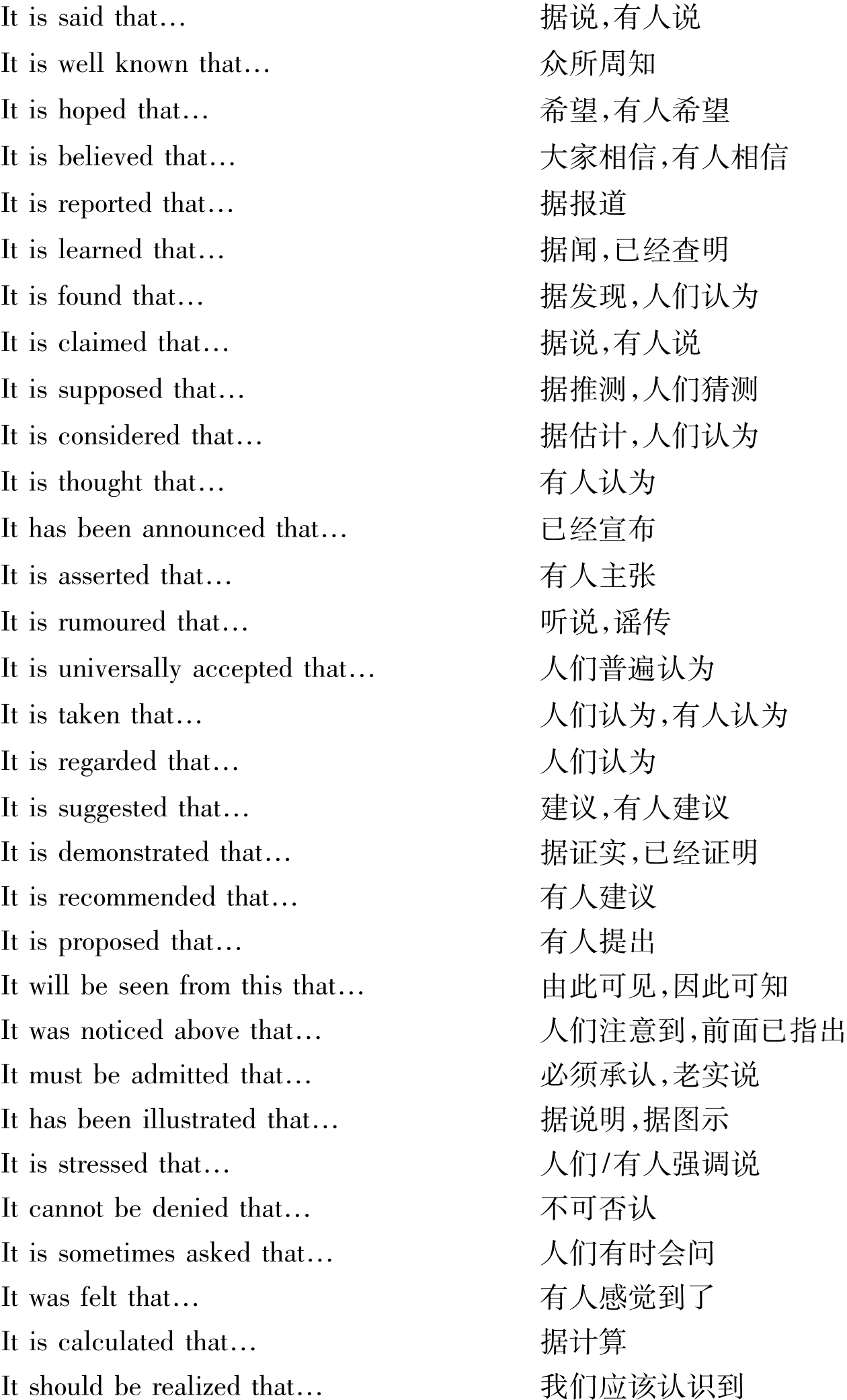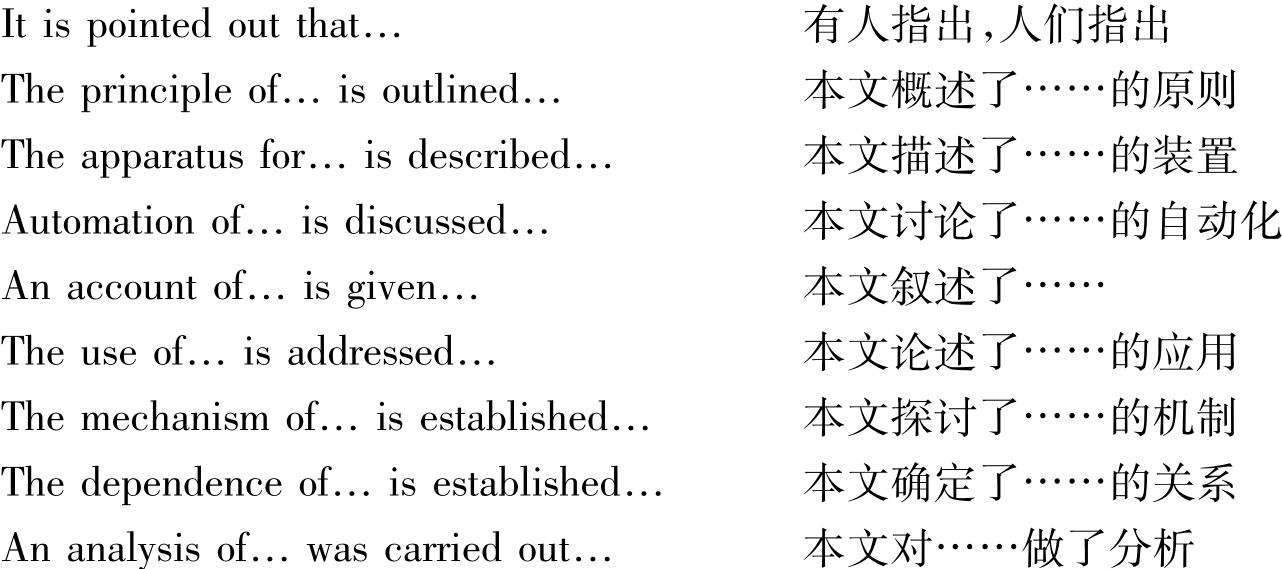3.2. 1 Common Methods of Translating the Passive-V...
3.2. 1 Common Methods of Translating the Passive-Voice被动句的翻译方法
The extensive use of passive-voice sentences is a distinct characteristic of English language.They are used in English when: 1)it is not necessary or not appropriate to mention the agent of the action; 2)it is impossible to mention the agent of the action; 3)the focus of the sentence is on the recipient of the action.Passive-voice sentences are also used to improve the coherence of the context or to make a better arrangement of sentences.In the scientific and technological papers,which are characterized by objectivity and impartiality,passive-voice sentences are more frequently used.So in order to do a good job in English-Chinese translation,we should master the skill of translating English passive-voice sentences properly.There are several methods of handling English passive-voice sentences in translation.
3.2. 1. 1 Convert the passive-voice English into the active-voice Chinese英语被动句转换成汉语主动句
1)The subject of a SL sentence is kept intact and the SL sentence is translated into a Chinese active sentence.
Even if some English passive-voice sentences are translated into Chinese active sentences without using such words as被,受,the active meaning of the TL sentences is still explicit.Under such circumstances,we can keep intact the subject of the SL sentence,and translate the SL sentence into a Chinese sentence which is active in form but passive in meaning.
 Other questions will be discussed briefly.
Other questions will be discussed briefly.
其他问题将简单地加以讨论。
Comments The subject of the original English is translated into the subject of an active-voice Chinese sentence.
 His house is located on the edge of the city.
His house is located on the edge of the city.
他的房屋坐落在市区的边缘。
Comments When the passive-form verb of the original sentence roughly equals an intransitive verb in semantics,we can directly translate the English sentence into an active-voice Chinese sentence.
 During the World Cup our streets were filled with football fans.
During the World Cup our streets were filled with football fans.
世界杯比赛期间,街上挤满了足球迷。
Comments When the passive form of an English sentence expresses a state in semantics,we can directly render the sentence into an active-voice Chinese one.
 Candidates are required to present themselves fifteen minutes before the examination begins.
Candidates are required to present themselves fifteen minutes before the examination begins.
考生应于考试前15分钟到达考场。
Comments When the passive form of an English sentence expresses an obligation or duty,we can directly convert it into active-voice Chinese.
2)The subject of the SL sentence is used as the object of the TL sentence in translation.
In handling English passive-voice sentences,we can convert the subject of the SL sentence into the object of the TL sentence and translate the SL prepositional object which is equivalent to the agent of the action into the subject of the TL sentence.If necessary,we can add general-reference subjects such as人们,我们,大家,有人,部分人,etc.in the translation.
 1,200 people had been saved by soldiers in the earthquake.
1,200 people had been saved by soldiers in the earthquake.
在地震中,战士们已救出1,200人。
Comments The by-agent,the logical subject of the original English,is translated into the subject of an active-voice Chinese sentence,while the subject of the original is converted into the object of the Chinese sentence.
 English is spoken in Britain,the U.S.and some other countries.
English is spoken in Britain,the U.S.and some other countries.
英国、美国和其他一些国家讲英语。
Comments The subject of the original is used as the object of an active-voice Chinese sentence in the translation,while the adverbial of place in the original is used as the subject of the Chinese sentence.
 It is suggested that meeting be put off till next Monday.
It is suggested that meeting be put off till next Monday.
有人建议会议推迟到下星期一举行。
Comments : When “it”is used as the formal subject of a passive-voice English sentence,we can translate the sentence by adding a logical subject to the Chinese version.This logical subject is often a pronoun of general-reference such as人们,大家etc.
 All metals are found not to conduct electricity equally well.
All metals are found not to conduct electricity equally well.
人们发现,并非所有的金属都能同样好地导电。
Comments In the TL sentence,a general-reference subject人们is added and the subject of the SL sentence is converted into the object of the predicate verb in the translation.
3.2.1.2 Convert passive-voice English sentences into be-verb Chinese sentences英语被动句转换成含“是”的汉语句
In Chinese,we often use “……是……的” to show a fact about people or things.Such a structure often has a passive meaning in Chinese,equivalent to a passive-voice English sentence.So some passive-voice English sentences can be conveniently rendered into be-verb Chinese sentences by adding是in the translation.
 In the old society,women were looked down upon.
In the old society,women were looked down upon.
在旧社会,妇女们是受歧视的。
 History is made by the people.
History is made by the people.
历史是人民创造的。
 Some plastics have been discovered by accident.
Some plastics have been discovered by accident.
某些种类的塑料是偶然发现的。
 The Statue of Liberty was presented to the U.S.in the nineteenth century by the people of France.
The Statue of Liberty was presented to the U.S.in the nineteenth century by the people of France.
自由女神雕像是法国人民在19世纪送给美国的。
 Rainbows are formed when sunlight passes through small drops of water in the sky.
Rainbows are formed when sunlight passes through small drops of water in the sky.
彩虹是阳光穿过天空中的小水滴时形成的。
 Rome was not built in a day.
Rome was not built in a day.
罗马不是一天建成的。
 Concrete is made of cement,sand,stones and water.
Concrete is made of cement,sand,stones and water.
混凝土是用水泥、沙子、石子和水制成的。
Comments In the above translations,the Chinese sentence pattern of “……是……的” is used to describe the objective circumstances of persons or things.It usually has a passive meaning in Chinese so that it is equivalent to the English passive form.
3.2.1.3 Convert passive-voice English sentences into subjectless Chinese sentences英语被动句转换成汉语无主语句
English sentences always have their subjects except for imperative sentences,but Chinese sentences can have no subject(subjectless sentences).This is an important difference between the two languages.Therefore,passive-voice English sentences can be converted into subjectless Chinese sentences when it is not necessary to tell readers the agent of an action.As a rule,a passive-voice English sentence without a by-agent but with a modal verb(auxiliary)can be translated into a subjectless sentence.
 Great efforts should be made to inform young people especially the dreadful consequences of taking up the habit.
Great efforts should be made to inform young people especially the dreadful consequences of taking up the habit.
应该尽最大努力告诫年轻人危害,特别是沾上这个习惯后的可怕后果。
 Smokers must be warned that doctors have reached the conclusion that smoking increases the possibility of lung cancer.
Smokers must be warned that doctors have reached the conclusion that smoking increases the possibility of lung cancer.
必须警告吸烟者,医生已得出结论,吸烟会增加患肺癌的可能性。
Comments As is shown in the translation of the above two sentences,we can convert the subjects of the original English sentence into the objects of subjectless Chinese sentences,and place them behind the predicate verbs.
 New source of energy must be found,and this will take time.
New source of energy must be found,and this will take time.
必须找到新的能源,这需要时间。
Comments The subject and the predicate of the original English sentence are placed together,and translated into a Chinese predicate and an object,but the sentence is without a subject.
 Water can be shown as containing impurities.
Water can be shown as containing impurities.
可以证明水含有杂质。
Comments The subject of the original English sentence can be translated into the sub-subject of Chinese.
 Wrongs must be righted when they are discovered.
Wrongs must be righted when they are discovered.
发现了错误一定要改正。
Comments The subjects in the main clause and the subordinate clause of the original English sentence are the same.So when this English sentence is translated into a subjectless Chinese sentence,错误serves as both the object of发现and改正.
3.2.1.4 Convert passive-voice English sentences into passive-form Chinese sentences用含有被动概念的词翻译英语被动句
In Chinese,we also have certain passive-form sentences that emphasize the passiveness of the action.If the original passive-voice English sentence is translated directly into a passive-voice Chinese sentence,the latter usually has the effect of emphasis.We can translate these kinds of sentences by adding Chinese functional words such as被、受、使、把、给、遭、由、为,etc.in the translation.
1)“被……” 、“给……” 、“叫……”
 The thief was arrested by the policeman.
The thief was arrested by the policeman.
小偷被警察抓住了。
 Over the years,tools and technology themselves as a source of fundamental innovation have largely been ignored by historians and philosophers of science.
Over the years,tools and technology themselves as a source of fundamental innovation have largely been ignored by historians and philosophers of science.
工具和技术本身作为根本性创新的源泉多年来在很大程度上被科学史学家和科学思想家们忽视了。
 Running water has long been used to turn the wheels of industry.
Running water has long been used to turn the wheels of industry.
很久以来,流水就被用来转动工业上用的轮子。
 Part or all of the light may be reflected,absorbed,or transmitted by the thing or object that comes into its way.
Part or all of the light may be reflected,absorbed,or transmitted by the thing or object that comes into its way.
一部分的光或全部的光可能给挡住其去路的东西或物体所反射、吸收或透射。
2)“遭……” 、“受……” 、“遭受……”
 Our roof was damaged in last night's storm.
Our roof was damaged in last night's storm.
在昨夜的暴风雨中,我家的屋顶遭到了破坏。
 Our foreign policy is supported by the people all over the world.
Our foreign policy is supported by the people all over the world.
我们的对外政策受到了世界人民的支持。
 The success of our economic development is continually lauded.
The success of our economic development is continually lauded.
我国经济发展所取的成功不断受到人们的赞扬。
 Last year the region was visited by the worst drought in 60 years.
Last year the region was visited by the worst drought in 60 years.
去年这个地区遭受到60年来最严重的旱灾。
3)“为……所……”
 Socialist ideology has been accepted by the people of the whole country.
Socialist ideology has been accepted by the people of the whole country.
社会主义思想体系已为全国人民所接受。
 Only a small part of the sun's energy reaching the earth is used by us.
Only a small part of the sun's energy reaching the earth is used by us.
传到地球的太阳能只有一小部分为我们所利用。
 The atomic theory was not accepted until the last century.
The atomic theory was not accepted until the last century.
原子学说直到上世纪才为人们所接受。
4)“(是)由” 、“让”
 Natural light or“white light”is actually made up of many colours.
Natural light or“white light”is actually made up of many colours.
自然光或者“白光”实际上是由许多种颜色组成的。
 History is made by the people.
History is made by the people.
历史是由人民创造的。
 Most letters from home are read to him by his girlfriend.
Most letters from home are read to him by his girlfriend.
他的家信大多数是让女友读给他听的。
5)“予以……” 、“加以……”
 The problem must be dealt with at the appropriate time.
The problem must be dealt with at the appropriate time.
这个问题必须在适当的时候予以处理。
 The subject will be discussed briefly later.
The subject will be discussed briefly later.
那个主题稍后将简单地加以讨论。
Comments These kinds of translation in the above sentences are frequently used to emphasize the actions of passiveness or to lay stress on the by-agents.
3.2.1.5 Convert by-agent and recipient into cause-and-effect行为者与接受者转换成因果关系
If the by-agent is an inanimate noun,not an animate one,not a person or animal,the by-agent and the recipient can be translated into a cause-and-effect relationship in Chinese.This treatment renders the translation natural and smooth in conformity to Chinese habitual way of expression.
 In that sense the characters are called into existence by the demands of the plot.
In that sense the characters are called into existence by the demands of the plot.
从这个意义上说,人物由于情节的需要而产生出来。
 The use of English in international diplomacy is strengthened by its acceptance as one of the official languages of the United Nations.
The use of English in international diplomacy is strengthened by its acceptance as one of the official languages of the United Nations.
由于英语被接受为联合国的官方语言之一,这就使英语在国际外交场合使用更为广泛。
Comments Such a situation indeed requires us to carefully analyze the original and comprehend it and see whether it contains a cause-and-effect relationship between the agent and the recipient.
3.2.1.6 Some useful patterns一些常用的句型

